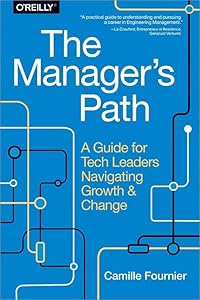Customer Services
Copyright © 2025 Desertcart Holdings Limited
Desert Online General Trading LLC
Dubai, United Arab Emirates



Full description not available


M**N
Terrible title for a great book about how software companies execute
I'm not a manager, nor do I want to be. I'm perfectly happy building stuff as a Software Engineer. I read this book to learn how managers bring value to organizations after my team went through 3 managers in 3 months. Each of the managers had different management styles with varying degrees of what I believed to be success.I learned what managers are responsible for and what they aren't, but this book is so much more. It covers how technology companies are run, from software engineers and product managers at the bottom to senior leadership at the top. There's something in this book for everyone who works at a tech company.This is a book written from first principles, starting with the problems which need to be solved when humans collaborate on a large complex system together. It suggests solutions to problems like how to distribute responsibility and how to improve performance of a struggling team, while taking us through some of the author's own experiences.
L**N
Difficult but worth reading
(4.5*) It wasn't a bad book, maybe even it was a good one, but the reading was veeery difficult. Somehow made it till the end.
Y**G
Real practical advice you can use to become better at your job
I am an experienced technology executive and consultant for engineering managers and execs. Based on my experience, this book is now the best book you can buy to learn modern engineering management.Previous contenders have included Peopleware, High-Output Management, The Mythical Man-Month, Good To Great, and others you've probably heard of. They are fine books, but they are either somewhat out of date, overly general, or a combination of both. This book is different. Fournier's book is a comprehensive overview of all the roles on the career path of modern technical management (starting from "senior engineer mentoring an intern" all the way up to CTO) and how to deal with the challenges at every step of the way.What sets this book apart, other than being comprehensive, is that it is the product of direct and highly relevant experience. Fournier has worked at huge companies, small startups, and medium-sized companies, all in hyper-competitive industry settings. You've probably read other management books and it always goes like this: they give you a piece of general advice about how to deal with an issue. You try it (assuming it is even specific enough to put into action and isn't just a feel-good HR platitude), you run into a snag, and now the advice is useless because the rosy assurances in the book about how employees were going to act reasonably didn't really work. You throw the book away and think there is something wrong with you because everyone keeps on talking about how the book is great and it's just your fault that you couldn't make this great advice work.Fournier's advice is not like that.She starts with the general outlines of the strategy, but then tells you about times when she had to confront the issue herself, how she tried to apply the strategy and screwed up (there are instances in the book where she openly admits "The first time I tried this I fell flat on my face"), what kinds of problems kept the strategy from working, how she modified the strategy and overcame the problems, and finally and most importantly, wraps up with a summary about how context and trade-offs affect how you apply the advice. Acknowledging and explaining how common variations and implementation details determine how a general strategy will play out is what makes this book unusually useful and relevant.Because everyone's job and situation are a little bit different, Fournier does an excellent job of breaking down broad strategies into their core principles, while separating out which details you can change based on individual situations, so that you can choose between trade-offs when you apply the strategy to the specific challenge you are confronting.Lastly, this book will give you confidence. Confidence that you're not alone, that others have faced the same problems and surmounted them, that you can do it too. Confidence that you can screw something up but still pick up the pieces and try again, that you'll still get it right the second or third time, and that you are going to get to where you want to go.This book is the product of years of tough lessons and hard-won success. Buy it. You won't regret it.
R**E
I wish I’d had this book a decade ago
Having grown from being an engineer to manager to startup founder, this is probably the best book I’ve read on the topic of technical leadership and management, and one I wish I’d had available to me a decade ago! All those hard lessons I got from screwing up and learning from my mistakes could have been skipped if Camille’s book had existed then!Though that dreaded word “manager” is in the title, it is not purely valuable to those who have a strong desire to engage in people management. Part of what I appreciate most about the structure is that the first chapter (which is available as a free PDF download from O’Reilly’s website) is valuable advice for individual contributors to build a better relationship with their managers.From there, the book steps chapter-by-chapter through the increasing scopes of team ownership you can have: How to be a mentor. How to be a Tech Lead. How to manage a few people… a team… multiple teams… teams of managers of teams. Then finally “the big leagues” of VP/CTO land.I think the book could be valuable to a wide array of folks:Existing Engineering Managers — READ IT NOW! READ IT! YOU HAVE NO EXCUSES! Block off time on your calendar if need-be! It gives advice both strategic and tactical.Engineers who think they might want to be an EM some day — This is the fastest way to see what the career path can look like, and get a sense for whether these are the types of problems you can see yourself being satisfied to think about some day.Engineers who might want to start a start-up some day — Being a founder isn’t just about the technology. If you’re in any way successful, you’ll have to start to build a team and think about people problems. This will give you a framework for when you’re the boss!Engineers who are in (or growing towards) Tech Lead roles — The first few chapters will help you understand the way your responsibilities have changed (from being responsible for your own code, to being responsible for the impact of multiple engineers) and give strategies for managing time and expectations. If you keep reading, you can also make educated decisions about if you might want to switch to engineering management in the future.Every other engineer — Read that free first chapter so you can have better relations with your manager!
Trustpilot
2 months ago
3 weeks ago